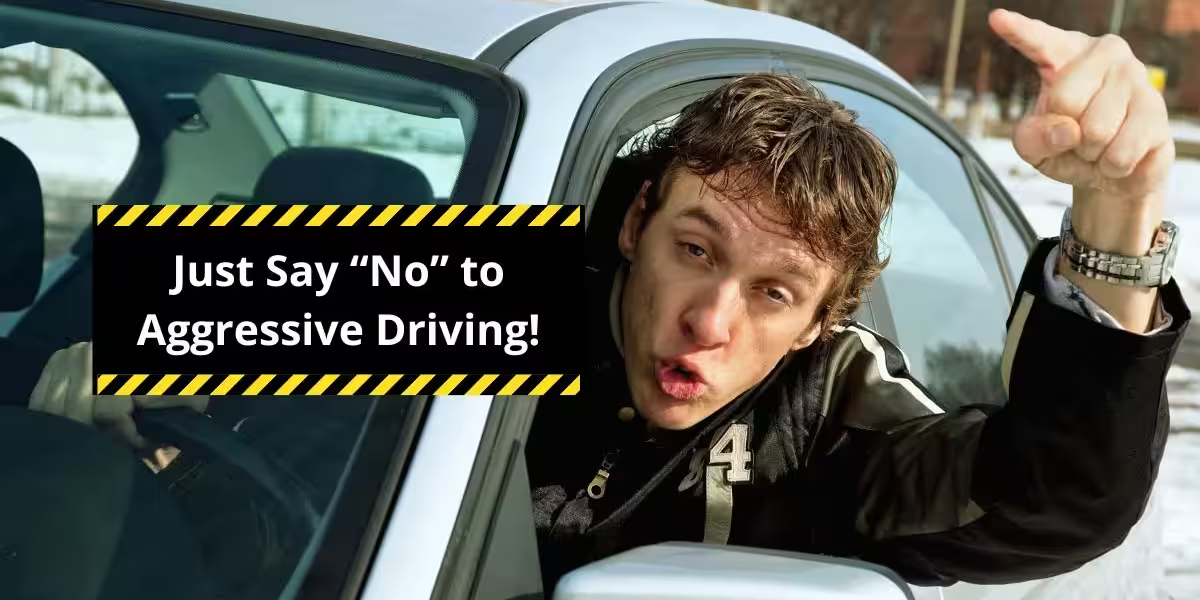
Missouri Drivers – Ranked Second Most Aggressive in the USA
Aggressive driving in Missouri and Kansas has reached alarming levels, with Missouri ranking second in the nation for aggressive drivers, according to a recent Forbes study. Dangerous behaviors such as speeding, tailgating, erratic lane changes, and ignoring traffic signals pose significant risks, especially in the Kansas City metropolitan area.
Local law enforcement agencies are stepping up efforts to crack down on aggressive driving. “Aggressive drivers, be warned,” announced local police agencies across the Kansas City metro last month. According to a Kansas City Police Department spokesperson, officers have already responded to forty-seven (47) fatal crashes in 2024, underscoring the urgent need for increased awareness and safer driving practices. At Kendall Law Group LLC, we are committed to raising awareness about these dangers and providing practical tips to help you avoid collisions and stay safe on the road.
Top 10 States with the Most Confrontational Drivers – Detailed
| State | Score | Percentage of Drivers Yelled At | Percentage of Drivers Tailgated | Percentage of Drivers Involved in Road Rage Incidents |
| California | 100 | 45% | 55% | 33% |
| Arizona | 95 | 43% | 53% | 32% |
| Rhode Island | 90 | 42% | 52% | 31% |
| West Virginia | 88 | 41% | 51% | 30% |
| Virginia | 85 | 40% | 50% | 29% |
| New Mexico | 83 | 38% | 48% | 28% |
| Oklahoma | 81 | 36% | 46% | 27% |
| Maryland | 78 | 35% | 45% | 26% |
| Washington | 76 | 34% | 44% | 25% |
| Ohio | 75 | 33% | 43% | 24% |
What is Aggressive Driving?
Aggressive driving is defined as the operation of a motor vehicle in a manner that endangers or is likely to endanger people or property. It includes a range of dangerous behaviors that are performed deliberately and with ill intention or disregard for safety. Some common examples of aggressive driving include:
- Speeding: Driving above the posted speed limit or too fast for road conditions.
- Tailgating: Following another vehicle too closely.
- Weaving in and out of traffic: Frequently changing lanes abruptly and without signaling.
- Running red lights or stop signs: Ignoring traffic signals and stop signs.
- Blocking other vehicles: Deliberately preventing other vehicles from passing or merging.
- Erratic or unsafe lane changes: Making sudden lane changes without signaling or checking for other vehicles.
- Rude or confrontational gestures: Using obscene gestures or yelling at other drivers.
- Failure to yield the right of way: Not yielding to other vehicles or pedestrians when required.
What Are the Dangers of Aggressive Driving?
Aggressive driving significantly increases the risk of accidents and poses various dangers to both the driver and others on the road:
- Increased Accident Risk: Aggressive driving behaviors, such as speeding and abrupt lane changes, reduce the driver’s ability to react to unexpected situations, leading to a higher likelihood of collisions.
- Severe Injuries and Fatalities: Accidents caused by aggressive driving are often more severe due to high speeds and reckless maneuvers, resulting in serious injuries or fatalities.
- Road Rage: Aggressive driving can escalate into road rage, where drivers may engage in violent confrontations, increasing the danger to themselves and others.
- Property Damage: Collisions and accidents caused by aggressive driving often result in significant damage to vehicles and property.
- Legal Consequences: Aggressive drivers may face legal penalties, including fines, license suspension, or even imprisonment for endangering public safety.
- Increased Stress: Aggressive driving contributes to a stressful and hostile driving environment, affecting the overall well-being of all road users.
- Higher Insurance Costs: Drivers with a history of aggressive driving may face higher insurance premiums due to the increased risk they pose.
Accidents caused by negligent aggressive drivers are generally more dangerous than your run-of-the-mill car wreck. This is often due to:
- Higher Speeds: Aggressive driving often involves speeding, which increases the force of impact in a collision, leading to more severe injuries and greater damage to vehicles and property.
- Reckless Behavior: Aggressive drivers tend to engage in risky maneuvers, such as weaving in and out of traffic, tailgating, and running red lights. These behaviors increase the likelihood of high-impact collisions and multiple-vehicle accidents.
- Reduced Reaction Time: Aggressive driving reduces the time available for drivers to react to unexpected situations, such as sudden stops or obstacles, making collisions more likely and often more severe.
- Anger and Impatience: Aggressive drivers are often emotionally charged, leading to impaired judgment and decision-making, which can result in dangerous driving actions and more severe accidents.
- Unpredictability: Aggressive drivers are unpredictable and can cause other drivers to react abruptly, potentially leading to secondary collisions or pileups that are more dangerous.
- Less Safety Equipment Usage: Aggressive drivers may be less likely to use seat belts or may drive vehicles that are not well-maintained, increasing the risk of injury or death in a collision.
Promoting safe driving habits and maintaining a calm and courteous attitude on the road can help reduce the incidence of aggressive driving and its associated dangers.
Aggressive Drivers and DUI/DWI
Aggressive drivers are significantly more likely to be under the influence of alcohol or drugs compared to non-aggressive drivers. Several studies and reports indicate a strong correlation between aggressive driving behaviors and substance impairment. Here are some key points:
Statistics and Studies
Research shows that a substantial proportion of aggressive driving incidents involve drivers who are impaired by alcohol or drugs. For instance, a study by the National Highway Traffic Safety Administration (NHTSA) found that approximately 56% of aggressive driving incidents involved alcohol impairment.
Another study indicated that drivers involved in road rage incidents were more than twice as likely to have alcohol or drugs in their system compared to the general driving population.
Alcohol Impairment
Alcohol significantly impairs judgment, reduces reaction times, and increases risk-taking behaviors, all of which contribute to aggressive driving.
Drunk drivers are more likely to exhibit aggressive behaviors such as speeding, tailgating, and running red lights.
Drug Impairment
Certain drugs, particularly stimulants like cocaine and methamphetamine, can increase aggression and lead to erratic and dangerous driving behaviors.
Marijuana and other psychoactive substances can impair perception and motor skills, leading to poor driving decisions and aggressive maneuvers.
Law Enforcement Observations
Police reports and roadside surveys consistently show that a significant number of drivers stopped for aggressive driving offenses test positive for alcohol or drugs.
Officers often note that impaired drivers are more likely to engage in reckless and aggressive behaviors, making them a danger to themselves and others on the road.
Impact on the Kansas City Metropolitan Area
The Kansas City metropolitan area, encompassing parts of both Missouri and Kansas, has seen a significant rise in accidents due to aggressive driving. These accidents often result in serious injuries or fatalities. Victims and their families face physical, emotional, and financial hardships due to these reckless behaviors.
Tips to Avoid Collisions with Aggressive Drivers
- Stay Calm and Avoid Engagement: When encountering an aggressive driver, stay composed. Avoid eye contact and do not make gestures that could escalate the situation.
- Maintain a Safe Distance: Keep a safe distance from aggressive drivers. If someone is tailgating you, gradually slow down to encourage them to pass.
- Let Them Pass: Allow aggressive drivers to pass by safely moving over. Holding your ground can provoke further aggression.
- Report Aggressive Drivers: Note the vehicle’s description and license plate if you encounter extremely aggressive driving. Report the behavior to local authorities.
- Use Your Indicators: Signal well in advance before changing lanes or making turns. Clear communication can prevent misunderstandings.
- Adjust Your Driving Style: Practice defensive driving by staying aware of your surroundings and anticipating potential problems.
- Plan Your Route: Plan your route to avoid congested areas and reduce stress, which can lead to aggressive driving.
- Use Technology Wisely: Use apps and in-car technology for real-time traffic updates and alternative routes to avoid aggressive driving hot spots.
- Educate Yourself and Others: Spread awareness about the dangers of aggressive driving. Encourage safe driving habits among friends and family.
Legal Implications of Aggressive Driving
Aggressive driving in Missouri and Kansas can lead to severe legal consequences. Law enforcement agencies actively monitor and penalize aggressive drivers through fines, points on licenses, and even imprisonment for extreme cases. Understanding these repercussions highlights the importance of maintaining safe driving practices.
What Are the Consequences of Aggressive Driving in Kansas City
Aggressive driving in Kansas and Missouri can lead to various legal and financial consequences, as well as impacts on a driver’s personal and professional life. Here are the key consequences in each state:
| Kansas | Missouri | Consequence |
| Aggressive driving behaviors can result in traffic citations and significant fines. Fines vary depending on severity and repeat offenses. | Aggressive driving can result in traffic tickets and fines. The exact amount varies based on the offense and jurisdiction. Repeat offenders face higher fines. | Traffic Citations and Fines |
| Kansas uses a point system to track violations. Points can increase insurance premiums and risk of losing driving privileges. Specific behaviors add multiple points. | Missouri uses a point system. Points are assessed for various violations, leading to higher insurance costs and license suspension. Aggressive behaviors add multiple points. | Points on Driving Record |
| Accumulating too many points or severe offenses can result in suspension or revocation of a driver’s license. Habitual offenders face stricter penalties. | Accumulating too many points can result in suspension or revocation of a driver’s license. Habitual offenders may need to attend driving courses or face longer suspensions. | License Suspension or Revocation |
| Insurance companies may raise premiums for drivers with aggressive driving violations. | Drivers with aggressive driving violations may see a significant increase in insurance premiums. | Increased Insurance Premiums |
| In extreme cases, particularly if aggressive driving results in serious injury or death, drivers may face criminal charges and jail time. | Severe cases, especially those involving injury or fatality, can result in criminal charges and jail time. | Possible Jail Time |
| Drivers cited for aggressive driving may need to appear in court, incurring court costs and legal fees. | Being cited for aggressive driving often requires a court appearance, incurring additional costs and legal fees. | Court Costs and Legal Fees |
| If aggressive driving results in an accident causing injury or death, the driver can face serious criminal charges. | If aggressive driving results in an accident causing injury or death, the driver can face serious criminal charges. | Criminal Charges |
| Aggressive drivers may be held liable for damages in civil lawsuits, resulting in significant financial penalties. | Aggressive drivers may be held liable for damages in civil lawsuits, resulting in significant financial penalties. | Civil Liability |
| Aggressive driving convictions can affect employment, especially for those who drive for a living or need a clean driving record. | Aggressive driving convictions can affect employment, especially for those who drive for a living or need a clean driving record. | Impact on Employment |
Both Kansas and Missouri emphasize the importance of safe driving practices and often have educational programs to promote awareness about the dangers of aggressive driving. Taking defensive driving courses can sometimes mitigate points on a driving record and demonstrate a commitment to safer driving habits.
Legal Support for Accident Victims
Victims of accidents caused by aggressive drivers in the Kansas City metropolitan area need robust legal support. At Kendall Law Group LLC, we specialize in handling cases involving serious injuries or wrongful deaths resulting from vehicular accidents. Our experienced trial lawyers are dedicated to securing justice and compensation for victims and their families.
How Kendall Law Group LLC Can Help
- Comprehensive Legal Assistance: We provide thorough legal support, from initial consultation to court representation, ensuring your case is handled with the utmost care and attention.
- Experienced Trial Lawyers: Our team of trial lawyers has extensive experience in dealing with aggressive driving accident cases, ensuring you receive the best possible legal representation.
- Compassionate Support: We understand the emotional and financial strain of dealing with a serious accident. Our compassionate team supports you every step of the way.
- Maximizing Compensation: We strive to secure the maximum compensation for your injuries, medical expenses, lost wages, and other damages resulting from the accident.
Kansas City Auto Accident Injury Trial Lawyers
Aggressive driving poses a significant threat to the safety of road users in the Kansas City metropolitan area. By understanding what constitutes aggressive driving and adopting proactive measures, we can work towards safer roads. If you or a loved one has been seriously injured or killed in an accident caused by an aggressive driver, seeking legal assistance is crucial. Kendall Law Group LLC is here to provide the support and skills needed to navigate your case and secure the justice you deserve.
If you or your loved one has been seriously injured or was killed in a car wreck caused by a negligent aggressive driver, give us a call for a free case evaluation at (816) 531-3100 or contact us HERE.
Additional Resources
Kansas City Drivers: The Second ‘Speediest’ In The Country – A Growing Concern
What is Distracted Driving and How Can We Prevent it?
The Deadly Consequences of Speeding: Stay Safe and Slow Down!
Distracted Driving Accidents in Kansas: Understanding the Risks and Laws for Safer Roads
Staying Safe in Kansas City: Addressing the Dangers of Street Racing and Unlawful Vehicle Use
Auto Accident Delayed Injury Onset: Why You Should Never Ignore Symptoms






